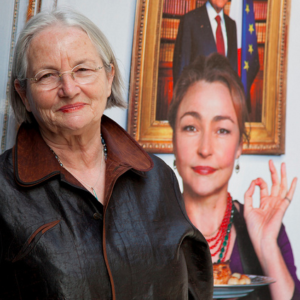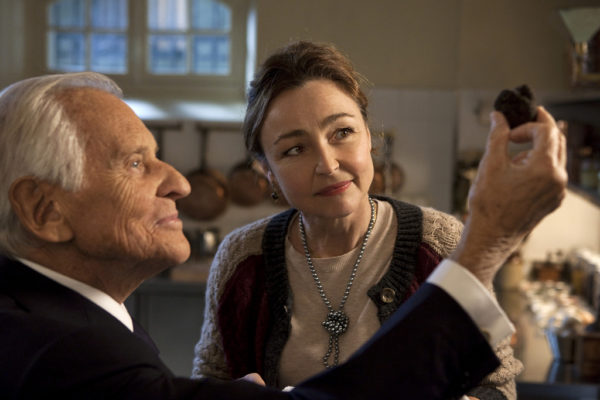Danièle Mazet-Delpeuch: French cuisine and feminism
French comedy-drama and feminist film ‘Les Saveurs du Palais’, or ‘Haute Cuisine’ as it’s known in English, has been referred to as a Francophile foodie fantasy. This retrospective film is, however, not pure fiction as its based on the life of a formidable farmhouse cook from Périgord in Dordogne… Danièle Mazet-Delpeuch.
Danièle was plucked from the farm to become French President François Mitterrand’s private cook in the Elysée Palace in the late ’80s. There she was said to have been exposed to substantial misogynistic and ‘macho’ behaviour.
This film shows the beauty of gastronomy while contrasting two key periods in Danièle’s life.
- her two-year stint working for l’ancien Président de la Republique François Mitterrand and
- later her stay at a French Scientific Base in Antarctica during her 50s.
Feminism in French cuisine
This story projects a gastronomical journey in differing culinary worlds and in competing culinary ideologies being traditional homestyle cooking versus molecular gastronomy. Moreover, it has a significant feminist backbone. Due to the popularity of this film, Danièle Mazet-Delpeuch has become a recognised feminist icon in France and internationally, and not just in the culinary context.
Danièle Mazet-Delpeuch: from adversity
At the time when Danièle was at Le Palais d’Elysée, the underlying social assumption was that men were, as the breadwinners, more professionally capable than women. Head Chef of the President’s main kitchen, Joël Norman, endorsed this sexist view during the time Danièle cooked in Mitterrand’s private kitchen. He stated in The New York Times’ article by Elaine Sciolino that
…sure it was macho in those days. The woman was supposed to cook at home, for the family. The men were the artists of the kitchen.”
The film shows young male chefs giving Hortense (the film character based on Danièle) degrading and disapproving looks during her first-day kitchen tour. We also learn that Danièle was nicknamed ‘Du Barry’ (Louis XV’s mistress). This implies that women were sex-objects and could not possibly earn their way up the ranks without so-called ‘sexual favours’.
Danièle not only experienced sexual discrimination at le Palais d’Elysée, but also in Antarctica. The Antartic job posting was described as strictly-for-men. Danièle in a recent SBS interview explained that she had to ‘fight’ for that position. She had to boldly declare “I’m going there” and to persuade them to take her on instead of a male cafeteria cook… malgré her renowned culinary glory.
Danièle Mazet-Delpeuch: to conquering
Despite this adversity, Danièle’s passion for cooking led her to have a significant influence on the French culinary identity. She…
- founded the Fois Gras weekend
- established the Ecole d’Art et Tradition Culinaire du Périgord (the region’s first cooking school on their local cuisine)
- opened a restaurant in her home
- became the first female cook in the French President’s private kitchen at the Elysée Palace
- was appointed the Head cook on a French scientific base in Antarctica
Recipe for success
An important ingredient in Danièle’s success and the feminist vibe she projects is her personal, traditional and respectful attitude toward French cuisine.
-
Food is power
Danièle, in an interview with The New York Times journalist Olivia Snaije, said: “…when you cook, you have a lot of power… you have the power to make people happy or grumpy… it was a great pleasure to find the perfect products, cook them simply, staying close to the original flavours; to make the President and the people close to him happy.”
Food to Danièle is not all about advanced techniques and mass production, but rather a vessel to positively influence all – from locals to even the President. -
Sharing her passion with all
While maintaining her humble down-to-earth nature, Danièle is known to talk herself through recipes and name the source of each ingredient. Her passion for local French produce and techniques in traditional hearty bourgeois cuisine projects a good drizzle of tender loving care in her dishes.
-
Culinary contagion
Danièle didn’t want to only create delicious dishes that remind us all of our grandmothers, but also to encourage us to develop a love of food.
-
Emotional story
Great dishes, are not just visually pleasing, but should:
– complement each locally produced ingredient and
– bring a wave of nostalgia and love to the dégustateur. In the eyes of Danièle and Francois Mitterrand… this creates le meilleur de la France!
Pearls of wisdom

Danièle is not only a highly influential French cook but also a feminist icon! Selon moi, her very being, reinforces that:
-
Passion and determination are key!
When you are passionate, you can advance and revolutionise old ways.
-
Women are strong!
Despite the condescending remarks, prejudice and sexual discrimination, women are resilient and are more than capable of doing a ‘man’s job’.
My message to all women is, remember to be passionate, be resilient and you will create the change you want to see in the world!
Do you have a French female role model? We would love to hear your views in the comments below.
Image credits:
- Hortense and Mitterrand by Espaço Itaú de Cinema via flickr
- Main Kitchen by Espaço Itaú de Cinema via flickr
- Hortense Laborie by Espaço Itaú de Cinema via flickr
- Eggs by Autumn Mott via Unsplash
- Danièle and Hortense by Carlos Gonález Santos via flickr











